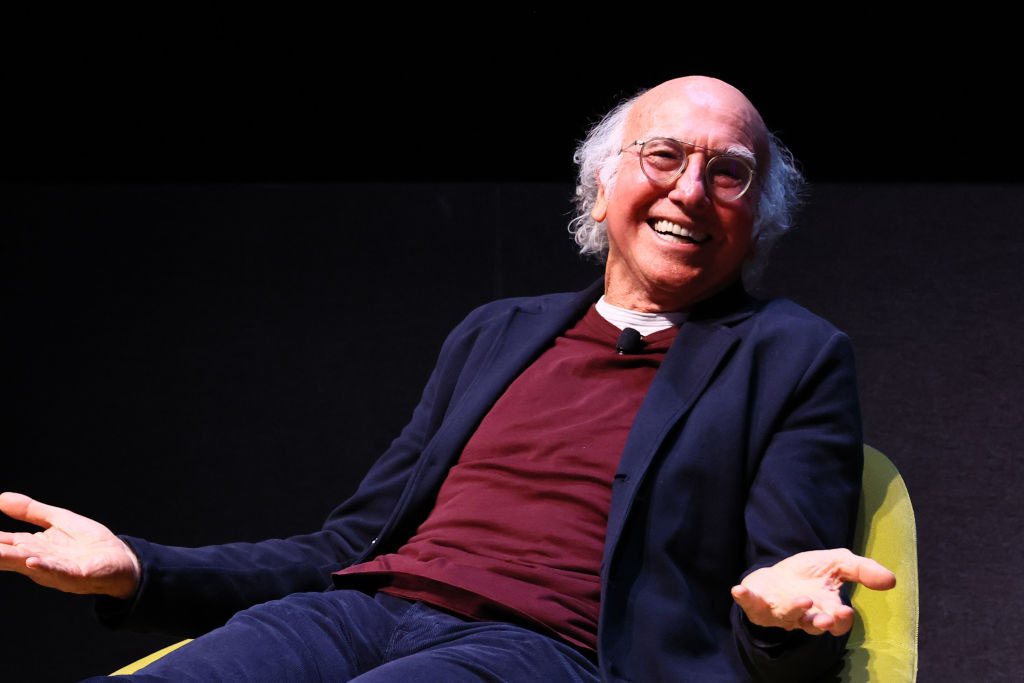 Larry David speaks onstage during An Evening With Larry David – A Farewell To “Curb Your Enthusiasm” hosted by HBO & Tribeca Festival on April 05, 2024 in New York City. (Photo by Theo Wargo/Getty Images)
Larry David speaks onstage during An Evening With Larry David – A Farewell To “Curb Your Enthusiasm” hosted by HBO & Tribeca Festival on April 05, 2024 in New York City. (Photo by Theo Wargo/Getty Images) Some of you may know I have a longtime love affair with “Curb Your Enthusiasm,” Larry David’s famously popular HBO comedy that ended Sunday night after a 25-year, 12-season run.
My problem now is that I’m trying to figure out what I can say to honor the show, without repeating what others have written.
Many of the essays I’ve read (besides those that comment on the Seinfeld connection in the ending) are sophisticated commentaries on the societal impact of the show, including one in particular by philosophy professor Mark Ralkowski, who calls Larry David our “Philosopher King.”
“[Larry David] stands as an underappreciated philosopher of our everyday lives,” Ralkowsky wrote in The New York Times. “He has taught us important truths about both how we live our lives and how we should live our lives. Most important, he’s been our foremost critic of the social rules that govern the way we interact, offering an enticing vision of social freedom that we’d be foolish to ignore.”
As I read that, I thought: OK, but what important truth has Larry David taught me?
When David, for example, asked a customer at an ice cream shop not to “abuse sampling privileges,” or when he called out someone who cut into a buffet line via the “cut and chat,” or when he talked about “middlers” who must know how to carry dinner conversation because they’re seated in the middle, among hundreds of other such examples, what truth was I learning?
This is where it’s tempting to riff about the societal impact of the show, what Ralkowsky calls the “societal strictures that might otherwise go unspoken.” But the stricture I’m most interested in is conversation itself. Indeed, this is what I learned after watching 12 seasons of “Curb”: The show, more than anything, is about what we choose to talk about.
Come with me to a Shabbat table where I was recently invited for a wonderful lunch. I noticed that after the blessing over the bread, the couple who hosted us took turns cutting the challah, and cutting the challah, and cutting the challah. Because I was seated with a perfect view of the cutting, entranced by the sight of a sharp knife cutting endlessly back and forth, I blurted out some silly comment about how I had never seen such an elongated challah cut.
I said it with some trepidation, as I was meeting this family for the first time. You see, my comment was personal. It was not about a safe subject like the rise in antisemitism. It was about what a specific person was doing at that specific moment. How would he take it?
I confess that I’ve been risking these conversational faux pas since my youth in Montreal, which is where I picked up this pesky habit: talking about stuff that happens in the moment.
When my buddies and I would sit down at a pizza joint at 1a.m. on a cold Saturday night, we were on a mission. We had to laugh. What was our favorite topic to get those laughs? More often than not, it was personal; it was about things we were observing in the moment; about teasing each other relentlessly.
We didn’t tease each other because we were mean but because it was great material. Whoever was the butt of a joke didn’t mind– as long as it was funny. And we didn’t laugh by telling regular jokes. These set jokes came from the outside. They weren’t as hilarious or hair-raising as the immediate and personal stuff that lived in the moment.
Since so much of the good material came from improvised moments and personal quirks, we ended up becoming pretty, pretty sharp observers (it helped that we weren’t distracted by a digital universe in our hands).
That may help explain my love affair with “Curb.” It showed me a truth I’ve come to appreciate: The funniest stuff comes directly from us—from what we do and what we say and how we react to the countless everyday moments we encounter. That’s true at a Shabbat table or anywhere else.
“Curb,” in short, gave us advice on what to talk about to get serious laughs, with the caveat that it’s preferable to only tease people who won’t call security on you. Of course, David routinely took this personal stuff to absurd limits that made us cringe– and laugh and laugh as we cringed.
As for those members of the tribe who may think Larry David’s zaniness is not a good look for Jews (I’ve met a few), all I can tell you is that few things are more endearing than someone who can poke fun at themselves in the service of laughter. Jewish comics have been doing that since they landed on these shores, and America is still laughing.
Yes, there’s more to life than laughter. It’s certainly more intellectually stimulating to talk about a great new book or the Torah portion of the week. I like to do that, too.
But when I need a few good laughs (which is often), I don’t mind planting myself in the middle of a table and keeping an eye out for anything interesting—like someone trying to beat the record for the world’s longest challah cut.
In case you were wondering, he laughed.























 More news and opinions than at a Shabbat dinner, right in your inbox.
More news and opinions than at a Shabbat dinner, right in your inbox.